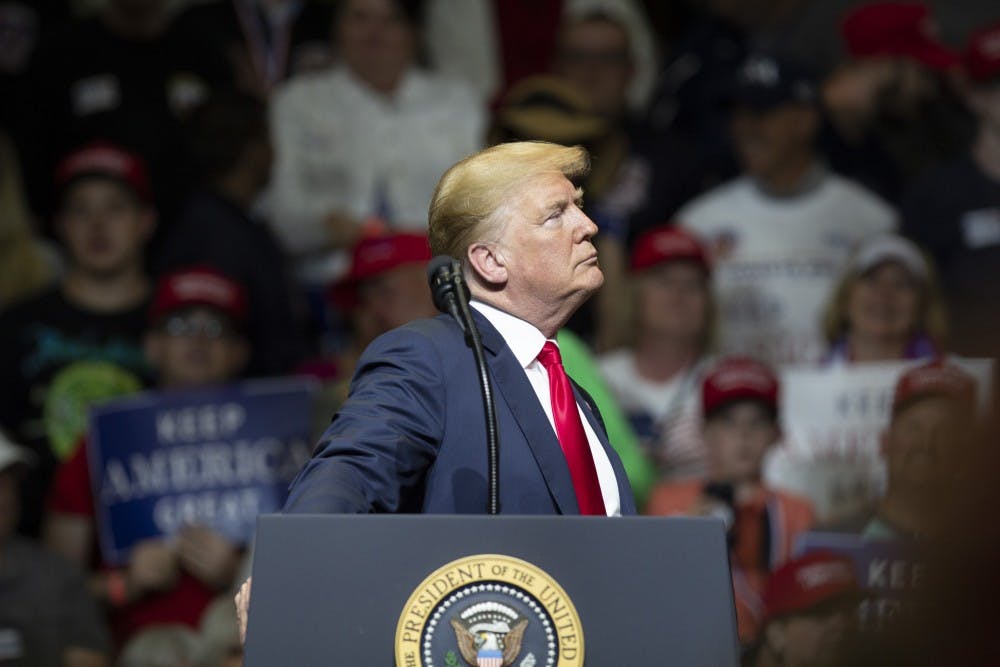Pulitzer Prize-winning New York Times columnist Thomas Friedman, former CIA Director John Brennan, ranking minority member of the House Armed Services Committee Rep. Adam Smith, D-Washington, and House Minority Whip Steny Hoyer, D-Maryland, among others, have all accused President Donald Trump of committing “treason” via his comments at Monday’s summit with Russian President Vladimir Putin in Helsinki, Finland.
Evidently, this line of thinking caught on. The Washington Post reports that on Tuesday, “treason” was at the top of the most frequently looked up words list on Merriam-Webster’s online dictionary.
This is a classic case of criminalizing political differences. As virtually any legal expert knows, Trump’s actions came nowhere near the legal definition of “treason” in Section 3, Article III of the Constitution. That definition basically covers situations in which an American switches sides in a state of war.
Allegations of treason are only the tip of the iceberg. For the past two days, the U.S. media has been overrun by hyperbole and wild speculation over Trump’s actions in Helsinki.
Another popular talking point has been that this summit further confirmed the idea Trump is working on behalf of Russian interests because Putin has blackmail on him. House Minority Leader Rep. Nancy Pelosi, D–California, said, “Trump’s eagerness to sell out America proves the Russians must have something — personally, politically or financially — on President Trump.”
This is a conspiracy theory that has been lent credence by hours upon hours of coverage on CNN and MSNBC, despite the fact there is no hard evidence for it. It has become a central feature of Rachel Maddow’s unhinged nightly coverage of “Russiagate.”
Since there is no hard evidence for this theory, its proponents have to rely on circumstantial evidence. As Pelosi suggested, it is the president’s willingness to act in favor of Russian interests and against American interests that proves the blackmail.
Even if the president does satisfy Russian interests, it doesn’t prove the blackmail theory. But let’s assume for the sake of argument this is sound logic. So, is Trump actually working in Russia’s interest? A cursory overview of Trump’s actions on the most crucial issues between the U.S. and Russia reveals he has been quite hostile to Russian interests, and certainly more hostile than Obama was.
Perhaps at the top of the list is Ukraine. Reversing Obama’s policy, Trump has been sending lethal arms to Ukraine to fight Russian-backed separatists. He has not caved to Putin’s demands the U.S. stop this.
Critics claim Trump has given Russia a free pass over the 2014 annexation of Crimea. Crimea is a lost cause for the U.S., and Trump probably does grasp that. But still, as Putin unhappily noted during Monday’s press conference in Helsinki, Trump maintains the position the annexation was illegal.
Trump has successfully secured commitments from our NATO allies to dramatically increase their defense spending, meaning NATO will be an even greater threat to Russia.
Syria is another major issue over which the U.S. and Russia have been at odds. Obama resisted bipartisan pressure to bomb the Russian-backed Assad regime throughout the first five years of the war. Trump, however, bombed Syrian government targets twice, ignoring Russia’s claims that the Assad regime was not responsible for the chemical attacks that had been attributed to it.
The Trump administration abrogated the Iran nuclear agreement, to which Russia is a party, against Russia’s wishes.
The Trump administration expelled 60 Russian diplomats in March, in response to the poisoning of a Russian double agent and his daughter in the U.K. — the largest expulsion of Russian diplomats in American history.
In April, Trump slapped new sanctions on members of Putin’s inner circle. Meanwhile, the U.S. is still maintaining sanctions on Russia over the annexation of Crimea and the alleged Russian interference in the 2016 election.
If Trump is a puppet of the Russian government, he is an extraordinarily bad one.
While Trump came across as quite friendly in Monday’s press conference, he did not cave into Russian demands on a single geopolitical issue. He praised Putin, but that’s hardly surprising. Trump praises authoritarian men constantly, from the fascist president of the Philippines Rodrigo Duterte to North Korean dictator Kim Jong-un.
What got Trump most in trouble about Monday’s press conference was that he implied he believes Putin’s denials of Russian meddling in the 2016 election, rather than the conclusions reached by U.S. intelligence agencies.
Again, this is hardly surprising. Trump is an egomaniac who hates to admit any lack of legitimacy to his win in the 2016 election.
Trump later reversed that implication by claiming he made a slip of the tongue when he said, “I don’t see any reason why it would be” Russia that hacked the DNC servers. He said he meant to say “wouldn’t” instead of “would,” and he endorsed the view that Russia meddled in the 2016 election.
Whether it really was a slip of the tongue or not, the fact that Russia may be responsible for running fake Facebook ads and providing extra transparency to American voters by leaking emails from the DNC and Hillary Clinton’s campaign is hardly the most crucial issue at stake.
Russia and the U.S. hold over 90 percent of the world’s nuclear weapons. It is crucial these two powers can engage with each other diplomatically without the U.S. political establishment trying to derail their diplomacy.
Trump serves the interests of the American ruling class, his family and himself, not the Russian government.
Americans should be pressuring Trump to pursue mutual downsizing of the U.S. and Russia’s nuclear stockpiles and to cooperate further on issues like Syria and Ukraine. Instead, conservative and especially liberal pundits are actively encouraging hostility between the two powers.






